You know, it’s often thought that fishing is a solo sport—a quiet escape from the hustle and bustle of daily life. But can I let you in on a little secret? Taking your pals along for some good ol’ angling could actually amplify its benefits in incredible ways! Now, before you raise an eyebrow at this, hear me out: after doing a bit of research, I stumbled upon countless social perks associated with group fishing trips.
So stick around as we delve deep into understanding how casting lines together can foster stronger bonds and encourage personal growth. I promise it’s worth a read—let’s drop our anchor here for some handy tips!
Key Takeaways
- Fishing with friends strengthens relationships and promotes bonding, leading to a greater sense of belonging and connection.
- Going fishing with friends provides opportunities for relaxation, stress reduction, and improved mental health.
- Fishing supports local businesses and communities, boosts the tourism industry, creates jobs, and contributes to economic growth.
Health Benefits of Fishing
Fishing provides numerous health benefits including exercise, increased strength, vitamin D intake, and improved immune system function.
Physical Benefits: Exercise, increased strength, vitamin D intake, improved immune system
Fishing is more than just a fun hobby. It gives your body a good workout too. Let’s talk about how it helps.
- First, fishing counts as physical activity. Casting the line or reeling in a big fish uses many muscles.
- And like any other exercise, fishing makes you stronger over time.
- Being outside for fishing means you get lots of sun exposure. This aids your body in making Vitamin D.
- The Vitamin D from sunlight plays a key role in how your immune system works.
- It even helps your body absorb more calcium and phosphorus.
- These are important for strong bones and overall health.
Mental Benefits: Stress reduction, increased focus, connection with nature, improved mental health
Fishing gives your mind many benefits. Here are some:
- It cuts down stress. Being near water and nature eases your brain. You feel calm.
- Fishing helps you pay attention better. You watch for fish, set bait, and take out fish. All these actions need focus.
- It lets you connect with nature. You see the lake or the sea, the sky and trees around you.
- Fishing also makes your mental health better overall. It can lighten a sad mood or a tense mind.
- Nature therapy happens when you fish in the outdoors. The sights and sounds of nature heal your nerves.
- Your mood gets better when you fish in nature’s lap.
- Mindfulness is another good thing that comes with fishing. You stay in the present while waiting for a bite on your line.
- Fishing is a fun way to get rid of stress and boost your mind’s power.
Social Benefits of Fishing
Fishing with friends allows for bonding experiences and strengthens relationships.
Bonding with friends and family
Going fishing with friends and family is a fun time. It helps us feel close to each other. We share laughs and make lasting memories on every trip. This act of bonding boosts our sense of belonging.
It can also teach skills like listening and working together. Stress goes away when we fish as a team, making us feel good inside. Sharing the catch at the end makes everyone happy too! These shared times help build strong ties in families and friendships alike, giving room for more love among us all.
Building new friendships
Fishing is not just about catching fish; it’s also about building new friendships. When we go fishing with friends, we have the opportunity to strengthen our existing relationships and create new ones.
It’s a chance to spend quality time together, share experiences, and enjoy each other’s company in a peaceful and natural setting. Research shows that up to 90% of anglers usually fish with a friend or family member, which leads to feelings of social connectedness and belongingness.
So, whether you’re casting your line from the shore or out on a boat, fishing can be a great way to meet like-minded people who share your passion for angling. Plus, when we fish together, we can learn from one another and develop our skills in this enjoyable hobby.
Strengthening relationships
Fishing is a wonderful activity that can bring people closer together and strengthen relationships. When we go fishing with friends or family, we create shared experiences and memories that last a lifetime.
It’s a chance to connect on a deeper level, away from the distractions of everyday life. Fishing promotes social interaction and teamwork, as we work together to catch fish and enjoy the outdoors.
Not only does fishing allow us to spend quality time with loved ones, but it also helps us build new friendships. Whether you’re joining a fishing club or participating in events and competitions, you’ll meet like-minded individuals who share your passion for angling.
These connections can lead to lasting friendships built on common interests.
By nurturing interpersonal relationships through fishing, we foster a sense of community and camaraderie. This not only benefits our personal growth but also contributes to the overall well-being of society.
Recreation and Leisure Benefits of Fishing
Fishing provides a great opportunity for relaxation and enjoyment, allowing individuals to get away from their daily stresses and connect with the outdoors.
Relaxation and enjoyment
Fishing is a great way to unwind and have fun. When I’m out on the water, I feel relaxed and at peace. The gentle motion of casting my line and waiting for a bite helps me let go of my worries and stresses.
Additionally, being surrounded by nature’s beauty enhances the relaxation experience. It’s just me, my fishing rod, and the calming sounds of the water. Fishing also brings enjoyment as I challenge myself to catch different types of fish or improve my skills.
It’s satisfying to see progress and feel a sense of accomplishment when I reel in a big catch. Overall, fishing provides a wonderful opportunity for relaxation and enjoyment in both body and mind.
Getting away from daily stresses
When I go fishing, it’s a chance for me to escape from the daily stresses of life. The peacefulness and serenity of being out on the water helps me relax and unwind. As I cast my line into the calm waters, I can forget about work, bills, and other responsibilities.
It’s just me, nature, and the thrill of waiting for a bite. Fishing provides a much-needed break from the hustle and bustle of everyday life, allowing me to recharge and rejuvenate my mind and body.
Plus, studies have shown that spending time outdoors can have positive effects on mental health, reducing stress levels and improving overall well-being. So when life gets overwhelming, grabbing my fishing gear is my way of getting away from it all and finding peace in nature’s embrace.
Connecting with the outdoors
When we go fishing, we get a chance to connect with the outdoors and enjoy the beauty of nature. Being surrounded by rivers, lakes, or oceans allows us to explore and appreciate our natural surroundings.
We can breathe in fresh air, listen to the calming sounds of water, and take in breathtaking views. This outdoor experience provides us with a sense of tranquility and peace that is hard to find in our busy lives.
Moreover, spending time outside while fishing gives us an opportunity to absorb Vitamin D from sunlight, which is essential for maintaining healthy bones and boosting our immune system.
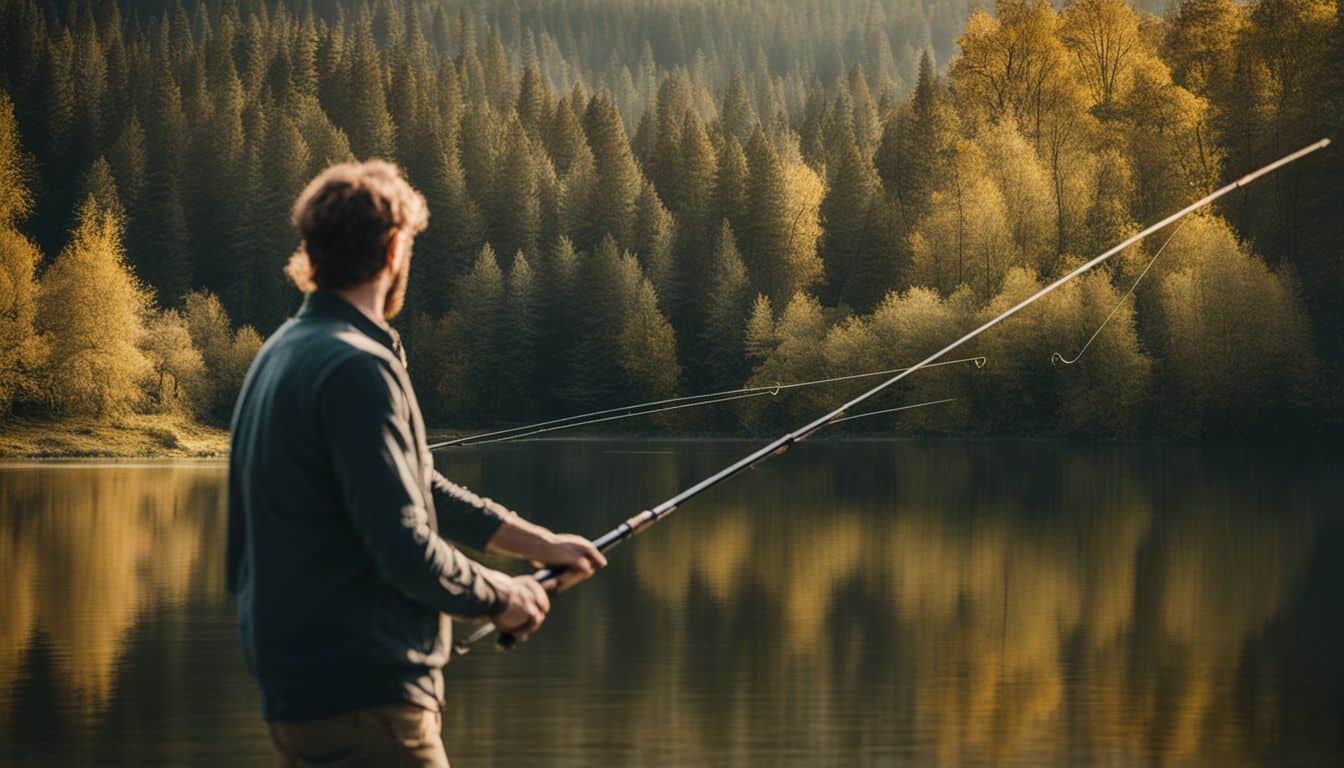
Economic Benefits of Fishing
Fishing also has positive economic impacts, supporting local businesses and communities, boosting the tourism and recreational fishing industry, and creating jobs. Discover how fishing can contribute to both your personal growth and the growth of your community by reading more!
Supporting local businesses and communities
I love how fishing not only brings me joy but also helps support local businesses and communities. When I spend money on fishing gear, licenses, and supplies at independent shops, it has a positive economic impact.
These small businesses contribute to the local economy by creating jobs and giving our community character. By supporting them, we’re not only investing in quality products but also helping our neighbors thrive.
It’s amazing how a simple fishing trip can make such a big difference in our community!
Tourism and recreational fishing industry
The tourism and recreational fishing industry is a vital part of the economy, providing significant economic benefits. In the United States alone, recreational fishing supports millions of jobs in areas such as manufacturing, distribution, and sales.
Saltwater recreational fishing generates billions of dollars in sales impacts and supports hundreds of thousands of jobs. Overall, the recreational fishing industry contributes billions to the economy and supports numerous job opportunities nationwide.
Additionally, this industry plays an essential role in supporting tourism and local businesses in coastal areas.
Job creation
As fishing enthusiasts, we can appreciate the economic benefits that come with our favorite pastime. One of these benefits is job creation. The fishing industry plays a significant role in supporting employment opportunities around the world.
In fact, it’s estimated that fishing and its associated industries economically support between 10-12% of the global population. In the United States alone, saltwater recreational fishing supports around 472,000 jobs.
These numbers highlight how engaging in recreational activities like fishing not only brings us joy but also contributes to social well-being and improves our quality of life by creating income-generating opportunities for many individuals within the labor force.
By participating in the fishing industry, whether through recreational or commercial means, we’re directly contributing to economic growth and supporting local businesses and communities.
Environmental Benefits of Fishing
Promote conservation efforts, support sustainable fishing practices, and protect fish populations and habitats.
Promoting conservation efforts
As an angler, I believe in promoting conservation efforts to protect our environment and preserve the future of fishing. Sustainable fishing practices are crucial for ensuring the survival of marine fauna and maintaining the health of our oceans and freshwater ecosystems.
By following guidelines for catch-and-release, practicing responsible angling techniques, and supporting organizations that promote conservation, we can contribute to protecting fish populations and their habitats.
As passionate anglers, we have a responsibility to be stewards of the environment and play an active role in sustainable natural resource management. Let’s do our part to ensure that future generations can enjoy fishing as much as we do!
Sustainable fishing practices
Sustainable fishing practices are important for the future of our oceans and freshwater ecosystems. They help us preserve biodiversity, protect marine habitats, and ensure the survival of endangered species.
By adopting sustainable fishing methods, we can maintain a balance in fish populations and promote their reproduction. This includes reducing bycatch, following guidelines like the “Good Fish Guide,” and preventing waste from plastic netting.
Sustainable seafood is also harvested or produced in a way that supports productive fisheries and coastal communities while keeping our ecosystem intact. However, achieving sustainability faces challenges such as pollution, illegal fishing, habitat alteration, bycatch, climate change, and the COVID-19 pandemic.

Protecting fish populations and habitats
I believe it’s important to protect fish populations and their habitats. By doing so, we can ensure the continued existence of different species in our oceans and freshwater environments.
Sustainable fishing practices play a crucial role in maintaining healthy fish populations by preventing overfishing and depletion. Conservation efforts focus on preserving biodiversity, recovering endangered species, and restoring habitats that have been damaged or destroyed.
Organizations like NOAA Fisheries and the U.S. Fish & Wildlife Service work towards these goals to support coastal communities and maintain the balance of marine ecosystems. Together, we can contribute to the sustainability of our fisheries and safeguard the future of fish populations for generations to come.
Fishing for Food
Fishing for food provides access to fresh and healthy meals, promotes self-sufficiency, and preserves cultural and traditional values.
Access to fresh and healthy meals
Fishing for food gives us the opportunity to enjoy fresh and healthy meals. When we catch fish, we can have nutritious meals that are rich in protein, which is good for our bodies.
Additionally, fishing allows us to consume seafood regularly, promoting access to fresh and healthy meals. This is important because a diet high in seafood has positive effects on preventing chronic diseases and maintaining overall health.
By practicing sustainable fishing practices, we can ensure that fish populations are protected, allowing us continued access to fresh food from our local waters. So let’s go out there and enjoy the fruits of our fishing labor while also nourishing ourselves with delicious and wholesome meals!
Self-sufficiency
Fishing for food is an important aspect of self-sufficiency. By catching fish, we can increase our access to fresh and healthy meals, especially if we prioritize sustainable practices.
Freshwater fishing in particular provides a protein source that can contribute to a self-sufficient lifestyle. Not only does fishing help meet our nutritional needs, but it also allows us to embrace cultural and traditional values associated with providing for ourselves.
Fishing for food promotes independence and confidence building, as well as a sense of accomplishment when we successfully catch our own meals. In cities, promoting sustainable fishing practices can play a role in achieving self-sufficiency by ensuring the availability of local food sources.
Cultural and traditional values
In many communities, fishing for food holds great cultural and traditional significance. It is a way of life that has been passed down through generations, preserving unique cultures and traditions.
The practices and knowledge surrounding fishing are deeply rooted in these communities, contributing to their identity and heritage. Coastal indigenous peoples, for example, consume more seafood per capita than the global average, highlighting the importance of fishing in their culture.
By practicing sustainable fishing methods and respecting local traditions, we can help preserve these valuable cultural values while also ensuring food security and supporting local economies.
Community Engagement and Volunteer Opportunities
Participating in fishing events and competitions, joining fishing clubs or organizations, and contributing to conservation efforts provide valuable opportunities for community engagement.
Discover how you can get involved and make a difference in the world of fishing.
Participating in fishing events and competitions
Participating in fishing events and competitions is a great way to get involved in the fishing community and have fun. Here are some reasons why you should consider joining:
- Community engagement: Fishing events bring people together who share a love for fishing. By participating, you can connect with other fishing enthusiasts and build relationships within the community.
- Volunteer opportunities: Many fishing events rely on volunteers to help with organizing and running the competition smoothly. Volunteering can be a rewarding experience and a chance to give back to the fishing community.
- Angling organizations: These organizations play a crucial role in organizing fishing events and promoting angling. By getting involved, you support these groups and contribute to their efforts in promoting the sport.
- Excitement: Fishing tournaments often come with added excitement, such as food, drinks, prizes, and social activities. Participating in these events can make your fishing experience more thrilling and enjoyable.
- Rewards and incentives: Some fishing events offer rewards or incentives for participants, which can include cash prizes or trophies. This adds an extra level of motivation to participate and perform well in the competition.
- Shared experiences: Fishing events provide an opportunity to meet new people who share your passion for the sport. You can exchange knowledge, learn from each other’s experiences, and create lasting memories together.
Joining fishing clubs or organizations
Joining fishing clubs or organizations is a great way to connect with other fishing enthusiasts and expand your knowledge and skills. Here are some benefits of joining these groups:
- Community Engagement: Being part of a fishing club or organization allows you to engage with your local community and contribute to conservation efforts. You can participate in events, clean-up initiatives, and educational programs that promote the protection of natural aquatic resources.
- Learning Opportunities: These clubs provide valuable opportunities to learn from experienced anglers. You can gain insights into different fishing techniques, tackle selection, and the best spots for specific fish species. Sharing knowledge and experiences with fellow members helps everyone improve their fishing abilities.
- Social Networks: Joining a fishing club introduces you to like-minded individuals who share your passion for fishing. It provides a platform for building strong friendships based on mutual interests. These social connections can lead to exciting fishing trips together or even lifelong friendships.
- Volunteering: Many fishing clubs actively participate in volunteer activities related to conservation and community service projects. By joining such organizations, you can give back to society while enjoying your favorite hobby.
- Embracing Wider Community Needs: Fishing clubs often extend their involvement beyond just angling activities. They actively support wider community needs through initiatives like fundraising for charity organizations or organizing events that promote inclusivity and accessibility in recreational fishing.
- Word-of-Mouth Recruitment: Fishing clubs play an essential role in recruiting new participants for recreational fisheries data collection. Members often recommend friends, colleagues, or family members to join these efforts, contributing valuable data that aids in managing fish populations effectively.
Contributing to conservation efforts
Conservation efforts are important for the health of our environment. As fishing enthusiasts, we can play a role in contributing to these efforts. Here are some ways we can make a difference:
- Volunteering with conservation groups: Many anglers choose to volunteer their time and skills to support organizations focused on protecting fish populations and habitats. By getting involved, we can actively contribute to environmental benefits.
- Promoting sustainable fishing practices: We can help conserve fish populations by practicing catch-and-release fishing, following size and bag limits, and using proper gear that minimizes harm to the fish.
- Spreading awareness: By sharing our knowledge about the importance of conservation with others, we can raise awareness and encourage more people to become responsible anglers.
- Participating in ecosystem monitoring: Some anglers volunteer to collect data on fish species and their habitats. This information helps scientists and policymakers make informed decisions about fisheries management.
- Supporting policies and investments: As fishing enthusiasts, we can advocate for policies that promote sustainable fishing practices, invest in conservation efforts, and address issues like climate change that impact our fisheries.
Tips for Fishing with Friends
When planning a fishing trip with friends, make sure to choose a location that offers a variety of fish species and ample space for everyone to enjoy.
Planning a fishing trip together
Planning a fishing trip with friends can be a fun and rewarding experience. Here are some tips to help you make the most of your time on the water:
- Choose a date and location that works for everyone: Coordinate with your fishing buddies to find a time and place that suits everyone’s schedules and preferences.
- Research the fishing spot: Look up information about the fishing spot ahead of time, such as what types of fish are commonly caught there, the best techniques to use, and any regulations you need to follow.
- Check the weather forecast: Keep an eye on the weather forecast leading up to your trip to ensure favorable conditions for fishing.
- Gather necessary gear and supplies: Make sure you have all the necessary fishing equipment, bait or lures, sunscreen, snacks, drinks, and any other essentials for a successful day on the water.
- Plan transportation: Determine how you will get to the fishing spot and organize transportation accordingly. Carpooling can be a great way to save on gas and enjoy each other’s company during the journey.
- Assign responsibilities: Divide responsibilities among your group, such as who will bring food, who will handle navigation if needed, and who will take charge of capturing memorable moments through photos or videos.
- Share knowledge and experiences: Take advantage of this opportunity to learn from each other’s expertise in fishing. Share tips, tricks, and stories to enhance everyone’s understanding and enjoyment of the sport.
- Support each other’s growth: Encourage one another throughout the trip by offering advice, celebrating successes, and providing assistance when needed. This collaborative approach will foster camaraderie among friends.
- Embrace flexibility: Remember that fishing is not always predictable. Be open-minded and adaptable if plans change due to unforeseen circumstances or changes in fish behavior.
- Enjoy each other’s company: While catching fish is exciting, remember that spending quality time with friends is the ultimate goal. Cherish the moments, share laughs, and create lasting memories together.
Sharing knowledge and experiences
As a fishing enthusiast, I know the value of sharing knowledge and experiences with friends. It’s a great way to learn new techniques and improve our angler skills. Here are some tips for sharing knowledge and experiences while fishing:
- Teach each other: Take turns showing your friends how to cast, reel in, or tie different knots. Share what you’ve learned over time and help them improve their fishing skills.
- Share your favorite spots: If you have a secret fishing spot that always yields good catches, don’t keep it to yourself. Bring your friends along and let them experience the same success you have.
- Swap stories: While waiting for the fish to bite, share stories about your past fishing adventures. Talk about the biggest fish you’ve caught or the funniest moments you’ve had on the water. This not only keeps things entertaining but also helps create camaraderie among friends.
- Learn from each other: Everyone has their own unique fishing tricks and techniques. Take advantage of fishing with friends who may have different approaches to angling. You might discover new methods that work well for you too.
- Collaborate on tactics: When faced with challenging conditions or difficult fish, work together as a team to come up with strategies to improve your chances of success. Brainstorm ideas, try different bait or lures, and adapt your techniques based on what is working best.
Supporting each other’s growth and learning
When fishing with friends, we can support each other’s growth and learning in many ways. Here are some tips:
- Share knowledge and experiences: Each person can bring their own expertise and fishing techniques to the group. By sharing what we know, we can all learn something new and improve our skills together.
- Collaborate on planning: When planning a fishing trip, involve everyone in the decision-making process. This way, everyone gets a chance to contribute ideas and opinions, fostering teamwork and collaboration.
- Encourage goal setting: Help each other set realistic goals for each fishing outing. Whether it’s catching a certain number of fish or trying out a new technique, supporting each other’s goals can motivate us to continuously improve.
- Provide constructive feedback: Offer constructive feedback to your friends during and after fishing trips. This helps us learn from our mistakes and identify areas where we can improve.
- Celebrate successes: Celebrate each other’s accomplishments, big or small. Recognizing achievements not only boosts morale but also encourages continuous growth and improvement.
- Be patient and supportive: Fishing is a skill that takes time to master. Be patient with yourself and with others as they learn. Offer support, encouragement, and guidance along the way.
- Embrace lifelong learning: Approach fishing as an opportunity for lifelong learning and personal development. Stay open-minded, try new techniques, and continue expanding your knowledge about different species of fish or fishing locations.
Conclusion on Social Benefits Of Fishing With Friends
Fishing with friends offers a wide range of social benefits that can contribute to personal growth and happiness. From bonding with loved ones to building new friendships, fishing brings people together in a unique way.
It also provides opportunities for relaxation, stress relief, and connection with nature. So grab your fishing gear and enjoy the social and mental health benefits that fishing with friends has to offer!
FAQs on Social Benefits Of Fishing With Friends
1. How can fishing with friends benefit my social life?
Fishing with friends can improve your social life by providing opportunities for bonding, communication, and shared experiences in a peaceful outdoor setting.
2. Is fishing suitable for all ages and skill levels?
Yes, fishing is a versatile activity that can be enjoyed by people of all ages and skill levels. There are different types of fishing that cater to varying abilities and interests.
3. Can fishing help strengthen friendships?
Absolutely! Fishing with friends allows you to spend quality time together, share stories, support each other’s success, and create lasting memories – all of which can strengthen your friendships.
4. What tips can enhance the social aspect of fishing with friends?
To enhance the social aspect of fishing with friends: communicate openly about expectations and preferences, collaborate on planning the trip, take turns assisting each other when needed, share snacks or meals during breaks, and celebrate success together.
5. Are there any safety considerations when going fishing with friends?
Yes, it is important to prioritize safety when going fishing with friends. This includes wearing appropriate safety gear (like life jackets), being mindful of weather conditions before heading out on water bodies or slippery terrains, being aware of local regulations regarding licenses or permits if applicable

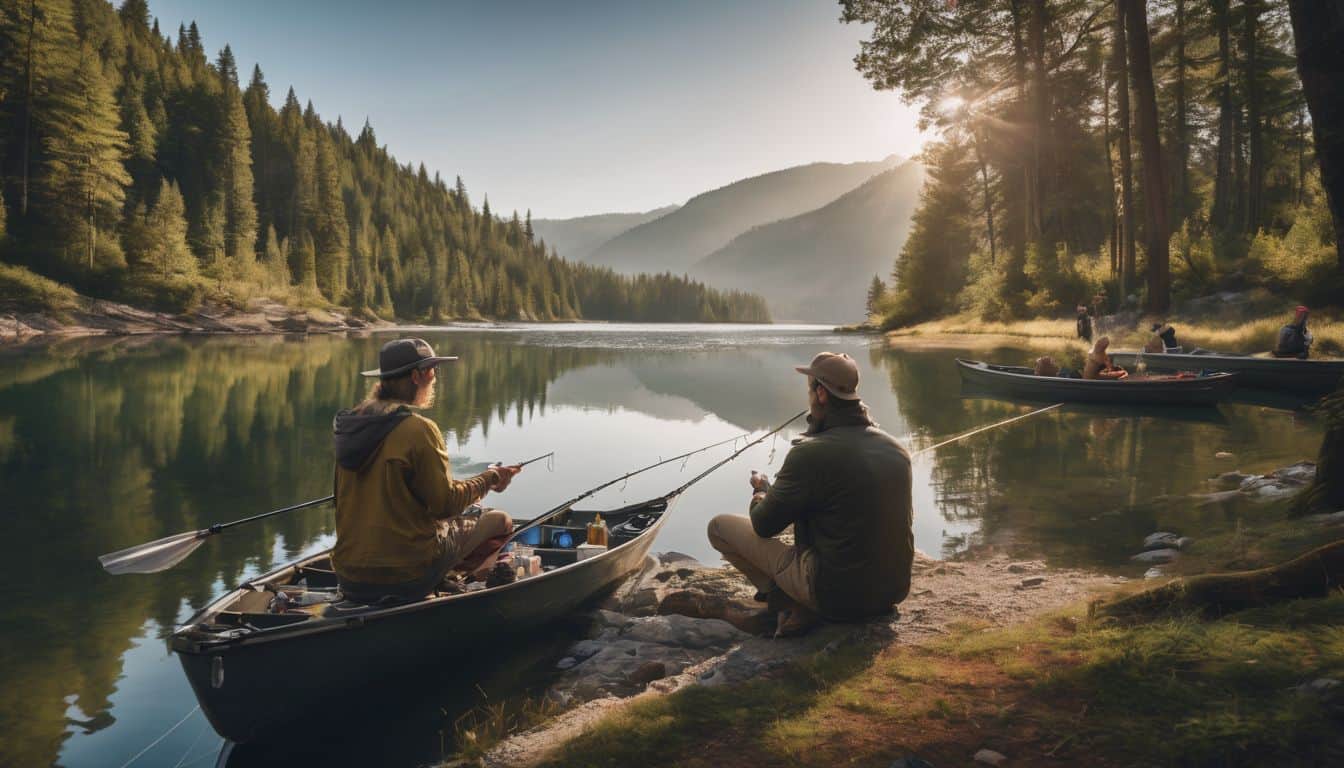
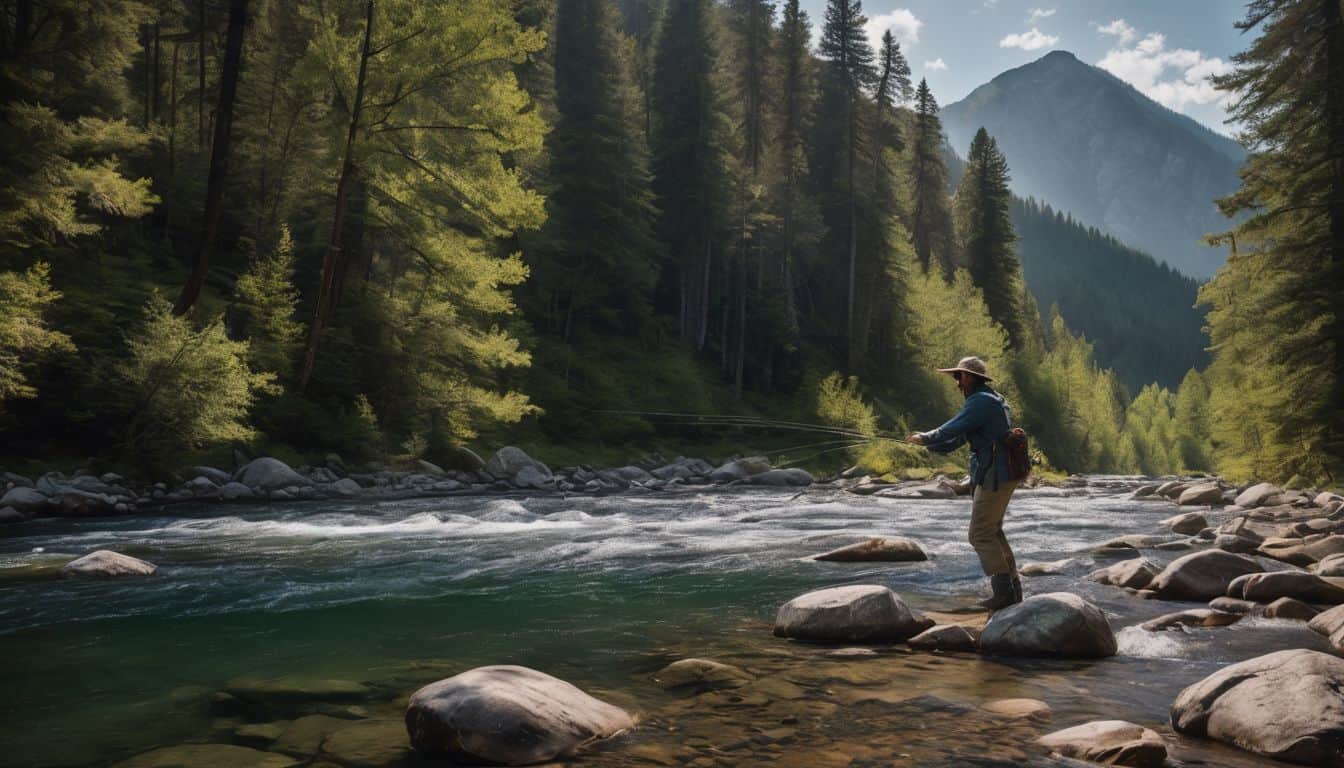
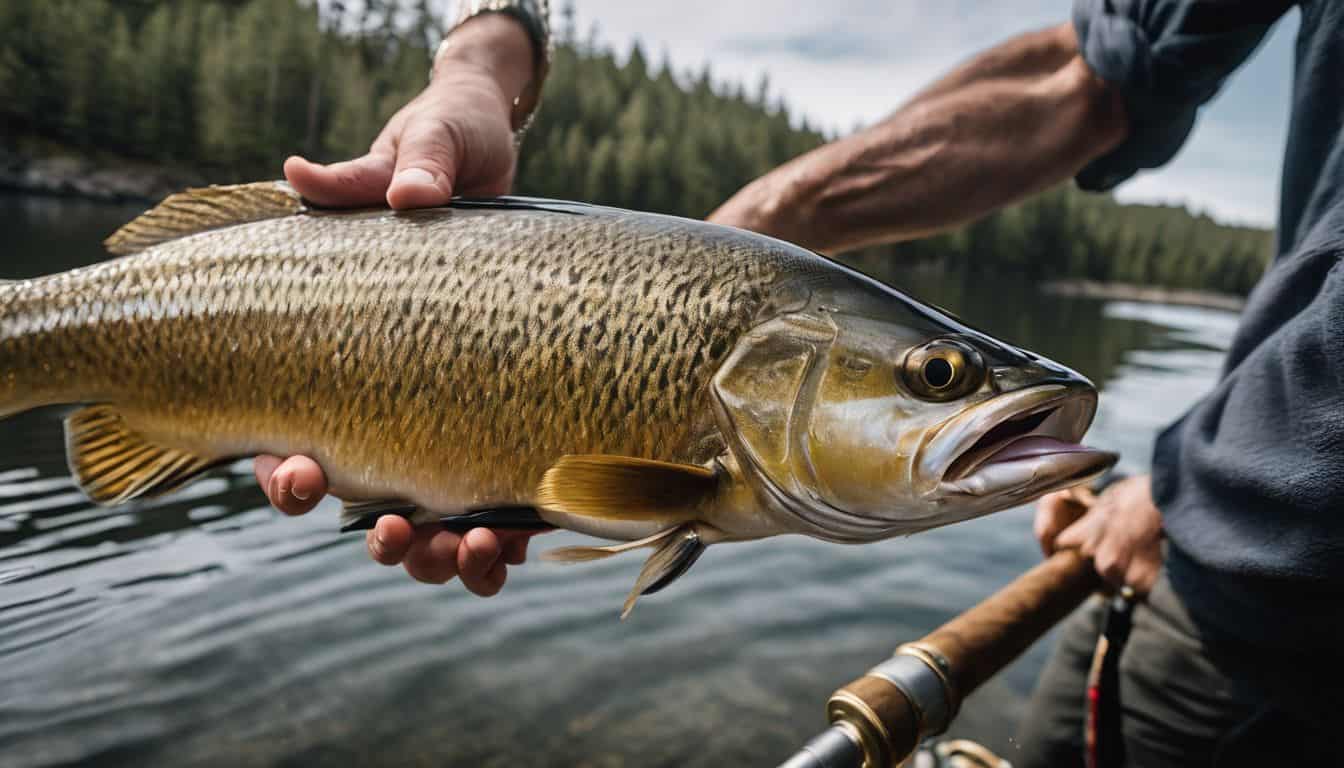
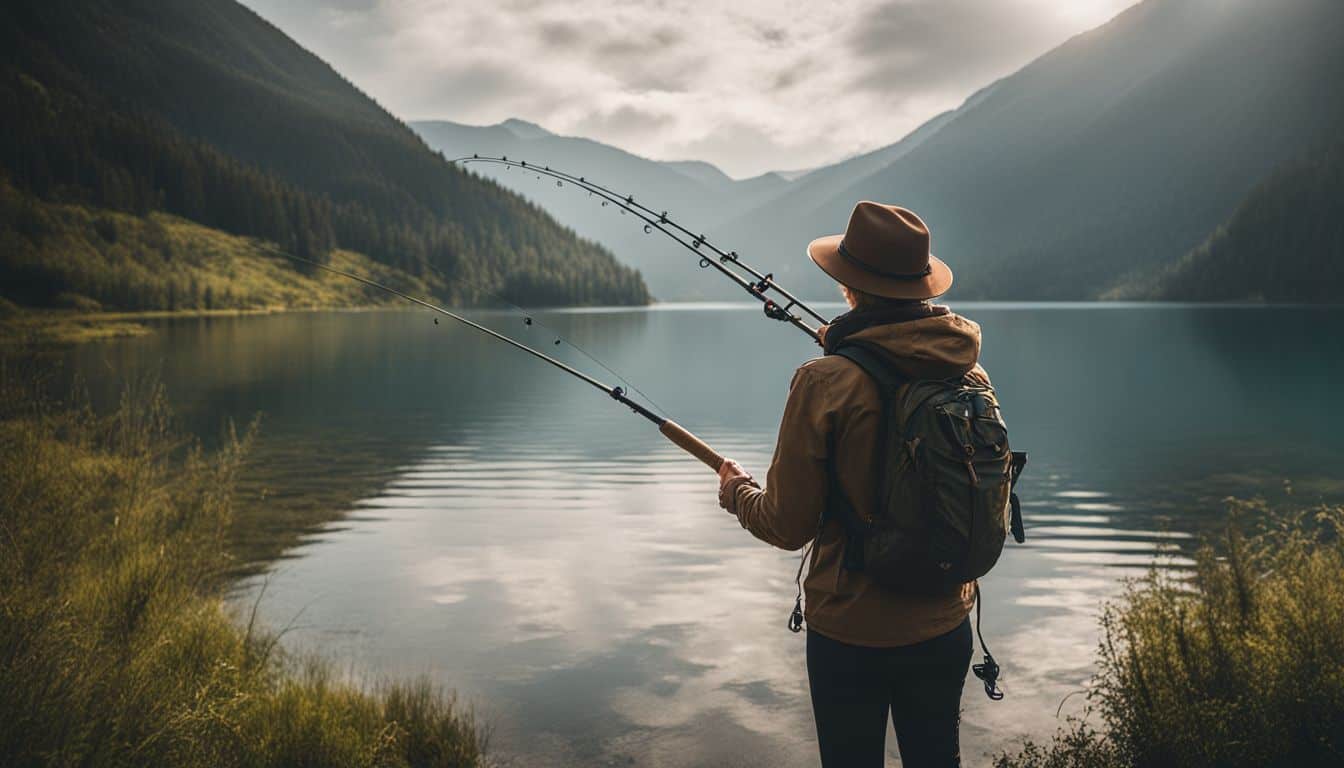
Leave a Reply